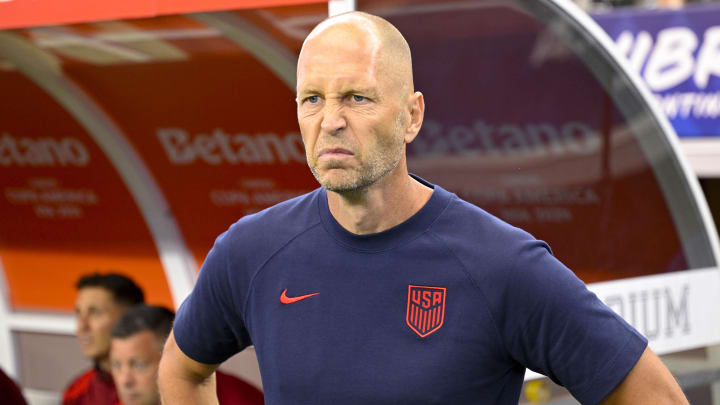It’s Time to Fire Gregg Berhalter

The easiest way to cope with a loss is to blame the ref. The next-easiest is to blame the coach. After its Copa America debacle, the U.S. Soccer Federation must choose between the two. Blaming the refs is tempting. But firing Gregg Berhalter is appropriate.
It is time for Berhalter to go, and this is not just a polite choice of words, like “relieved of his duties” or “parted ways.” Berhalter has held the job for five years through two stints. The U.S. men’s national team is underachieving in ways that reflect directly on leadership. The World Cup is just two years away. It is time.
A national team coach’s primary job is to get the talent to coalesce. The main avenues toward that end are tactical and cultural. At the 2022 World Cup, the U.S. scored just three goals in four games, and at Copa America, the Americans scored only once in their two toughest games, against Uruguay and Panama. But the cultural signs are also concerning.
Berhalter takes considerable pride in his ability to steel his players for competition. After the 2022 World Cup, he boasted of how he almost sent Gio Reyna home for a poor attitude, sparking a series of events that almost cost Berhalter his job. Players support Berhalter staunchly and, no doubt, sincerely; Reyna has been particularly vocal lately. The problem is that this has not translated to competition.
Before the Americans’ second Copa America match, against Panama, Berhalter warned his players about what would happen. Panama would try to make up the talent gap by fouling constantly, and referee Ivan Barton would probably let Panama get away with it. Well, Panama persistently fouled the U.S., and Barton did an egregiously awful job. He lost control of the match. But the Americans knew that would happen—and they still handled it poorly.
A frustrated Tim Weah punched Panama’s Roderick Miller in the head, earning a much-deserved red card. The U.S. had to play most of the match with 10 players. U.S. star Christian Pulisic seemed to let the poor officiating get to him in that game—and then he did it again in the next one. Pulisic said after the loss to Uruguay that he “can’t accept” what he saw from ref Kevin Ortega.
In a vacuum, Pulisic is correct. In the first half of U.S.-Uruguay, Ortega inexplicably pulled a yellow card but refused to stop play, the kind of refereeing error that is hard to comprehend. But the U.S. did a lousy job of playing through the poor officiating. It seemed to affect play.
In the 2022 World Cup round of 16, the U.S. suffered an inexplicable defensive breakdown just before halftime against the Netherlands, turning a 1–0 deficit into 2–0. Afterward, Tyler Adams said “a game like that, it comes down to the margins, obviously … you give them three, four chances, they're going to put three or four away."
That was one game. The U.S. had a young team. You can argue that advancing to the knockout stage made that World Cup a success. But the Americans barely advanced; needing a win over Iran, they won, 1–0.
Berhalter took over in December 2018, U.S. Soccer let his contract expire after the World Cup and then rehired him in June 2023. By now, there should be some evidence that the U.S. has improved on soccer’s biggest stages, and there just isn’t enough.
Is that all Berhalter’s fault? Of course not. But when evaluating a coach, part of the equation is the message it sends.
U.S. Soccer Federation technical director Matt Crocker has already acknowledged the USMNT “must do better” after the Copa America flameout. If Crocker keeps Berhalter, he would be tacitly blaming the refs, rather than the coach. He would be saying that he is happy with the culture of the program—the same culture that caused the Americans to lose composure and wilt offensively. How will any of this get better if U.S. Soccer decides that is O.K.?
Again: This is not all Berhalter’s fault. Perhaps another coach would have had the same problems coaching this group of players from December 2018 until now. But it happened under Berhalter. The question now is not just whether the U.S. can find a better coach. A new coach would come armed with credibility simply because he is a new coach. It is time.
